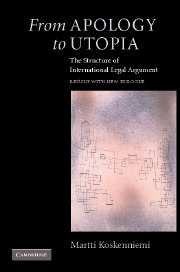Book contents
- Frontmatter
- Contents
- Preface to the reissue
- Acknowledgements
- List of abbreviations
- Introduction
- 1 Objectivity in international law: conventional dilemmas
- 2 Doctrinal history: the liberal doctrine of politics and its effect on international law
- 3 The structure of modern doctrines
- 4 Sovereignty
- 5 Sources
- 6 Custom
- 7 Variations of world order: the structure of international legal argument
- 8 Beyond objectivism
- Epilogue (2005)
- Bibliography and Table of cases
- Index
2 - Doctrinal history: the liberal doctrine of politics and its effect on international law
Published online by Cambridge University Press: 16 July 2009
- Frontmatter
- Contents
- Preface to the reissue
- Acknowledgements
- List of abbreviations
- Introduction
- 1 Objectivity in international law: conventional dilemmas
- 2 Doctrinal history: the liberal doctrine of politics and its effect on international law
- 3 The structure of modern doctrines
- 4 Sovereignty
- 5 Sources
- 6 Custom
- 7 Variations of world order: the structure of international legal argument
- 8 Beyond objectivism
- Epilogue (2005)
- Bibliography and Table of cases
- Index
Summary
In order to grasp the structuring effect of the descending and ascending patterns of arguing about international order and obligation I shall relate them to the liberal doctrine of politics which emerged between the 16th and 18th centuries as an attempt to escape the anarchical conclusions to which loss of faith in an overriding theologico-moral world order otherwise seemed to lead. The demand for intellectual autonomy which started out as an epistemological break with scholasticism in natural sciences and philosophy led quite logically into a demand for political liberty. And full political liberty seemed incompatible with society.
The fundamental problem of the liberal vision is how to cope with what seem like mutually opposing demands for individual freedom and social order. The liberal attempt to tackle with this conflict is by means of reconciliation, or paradox: to preserve freedom, order must be created to restrict it. There is, in other words, an ascending, individualistic argument: social order is ultimately legitimate only insofar as it provides for individual freedom. And there is the descending, communitarian argument: individual freedom can be preserved only if there is a normatively compelling social order. This reconciliation rests on the Rule of Law: a legitimate social order is one which is objective, one that consists of formally neutral and objectively ascertainable rules, created in a process of popular legislation.
- Type
- Chapter
- Information
- From Apology to UtopiaThe Structure of International Legal Argument, pp. 71 - 157Publisher: Cambridge University PressPrint publication year: 2006
- 1
- Cited by



